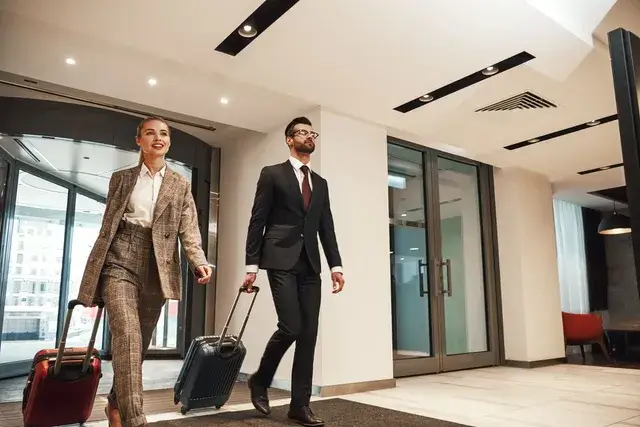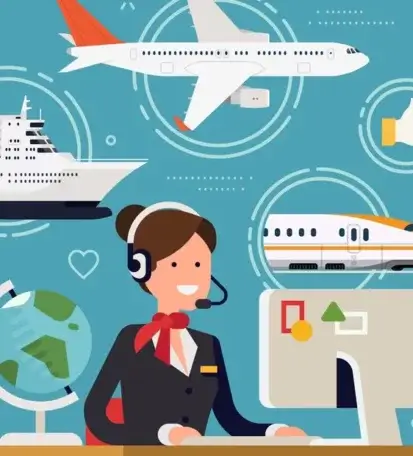Business Travel Guide
Different Types of Business Travel and Accommodation

Business travel is an essential part of many companies’ operations. It is a way to network, meet clients, attend conferences, and close deals. Business travel can take many forms, from a quick day trip to a long-term international assignment. The type of business travel required depends on the purpose of the trip.
One of the most important aspects of business travel is accommodation. Choosing the right type of accommodation can make or break a business trip. There are many types of accommodation available, from budget hotels to luxury apartments.
The different types of business travel and accommodation required depends on the length of trip, budget, and the preferences of the traveller. It is important to choose accommodation that is comfortable and convenient, and that meets the needs of the traveler.
Key Takeaways
- Business travel can take many forms, from a quick day trip to a long-term international assignment.
- Choosing the right type of accommodation is important for a successful business trip.
- The type of accommodation required depends on the length of the trip, the budget, and the preferences of the traveller.
Types of Business Travel & Purpose
When it comes to business travel, there are several purposes that companies may have. Understanding the different types of business travel can help companies create policies that cater to their employees’ needs and preferences.
- Conferences and Trade Shows
One of the most common reasons for business travel is attending conferences and trade shows. These events allow professionals to network with others in their industry, learn about the latest trends and technologies, and showcase their products or services. Companies may organise company trips for their employees to attend conferences and trade shows to represent their brand, gain new insights, and generate leads.
- Client Meetings
Client meetings are another common reason for business travel. Companies may need to meet with existing or potential clients to discuss projects, negotiate deals, or provide updates. Face-to-face meetings can help build trust and strengthen relationships, which can be crucial in business.
- Corporate Retreats
Corporate retreats are a type of business travel that involves taking employees to a different location for team building, training, or strategic planning. These retreats can be a great way to boost morale, improve communication, and foster collaboration. Companies may choose to hold retreats in scenic locations to provide a change of scenery and help employees relax and recharge.
- Training and Development
Finally, companies may send their employees on business travel for training and development purposes. This could include attending workshops, seminars, or courses to learn new skills or improve existing ones. Companies may also send employees on secondments or assignments to other locations to gain new experience and broaden their horizons.
5 Business Travel Accommodation Types
When it comes to business travel, choosing the right type of accommodation is essential for a comfortable and productive trip. Below are some of the most common types of accommodation for business travellers.
1. Hotels
Hotels are the most popular type of accommodation for business travellers. They offer a range of amenities such as room service, laundry service, and 24-hour reception, which can make a business trip more comfortable and convenient. Hotels can vary in price and quality, from budget options to luxury hotels.
Pros
- Convenience: Wide variety of options, readily available amenities (room service, laundry, concierge), often located in central areas near business districts.
- Predictability: Standardized service and facilities, consistent quality across different locations of the same chain.
- Safety and Security: Secure access, on-site staff, well-lit common areas.
Cons
- Cost: Hotels, especially luxury ones, can be expensive.
- Limited Space: Standard rooms might feel cramped, especially for extended stays.
- Noise: Potential for noise from other guests or hallway activity.
2. Serviced Apartments
Serviced apartments are a popular choice for business travellers who need more space and privacy. These apartments come fully furnished and equipped with a kitchen, living room, and bedroom, making them ideal for longer stays. They also offer amenities such as cleaning services and 24-hour reception.
Pros:
- Space and Privacy: Separate living and sleeping areas, ideal for longer stays or those who need to work remotely.
- Kitchen Facilities: Cook your own meals, saving money and offering dietary control.
- Home-like Feel: More relaxed and comfortable environment compared to hotel rooms.
Cons:
- Price: Generally more expensive than hotels, especially for shorter stays.
- Limited Services: May not offer amenities like room service or daily housekeeping.
- Location: Serviced apartments might be located further from business districts.
3. Hostels
Hostels are a budget-friendly option for business travellers who are looking to save money. They offer shared dormitories or private rooms at a lower cost than hotels. Hostels can be a good option for solo travellers who are looking to meet new people and socialize.
Pros:
- Budget-Friendly: The most affordable option, perfect for short work trips with a focus on minimizing expenses.
- Socialization: Great way to meet fellow travellers and potentially network with people from different industries.
- Location: Hostels are often centrally located, close to public transportation and tourist attractions.
Cons:
- Shared Space: Limited privacy in shared dormitories, potential for noise and disruptions.
- Basic Amenities: Minimal services, often shared bathrooms and limited housekeeping.
- Security Concerns: Not ideal for those who value high levels of security and privacy.
4. Guest Houses
Guest houses are a great option for business travellers who are looking for a more personal and local experience. They are typically smaller than hotels and offer a more homely atmosphere. Guest houses can vary in price and quality, from budget options to luxury guest houses.
- Pros:
- Local Experience: Personalized service, the opportunity to interact with the owner or staff and gain local insights.
- Unique Character: Charming and historic buildings, often with a homey feel and local touches.
- Potentially Budget-Friendly: This can be more affordable than hotels in some locations, especially smaller towns.
- Cons:
- Limited Availability: Guest houses are less common compared to hotels, and might have fewer location options.
- Variable Amenities: Amenities can vary greatly, check details before booking.
- Unpredictable Standards: Quality and service could differ significantly compared to standardized hotel chains.
5. Extended Stay Hotels
Extended-stay hotels cater to the needs of long-term travellers, offering spacious accommodations and a host of amenities designed for extended stays. These properties typically feature suite-style rooms with separate living and sleeping areas, along with fully equipped kitchens and on-site laundry facilities. With flexible booking options and competitive rates, extended-stay hotels provide a practical and cost-effective solution.
Pros
- Cost-Effective for Long Stays: Often offer lower rates than traditional hotels for stays exceeding a week or more.
- Apartment-style Rooms: Provide more space and amenities like kitchens or kitchenettes, living areas, and laundry facilities compared to standard hotel rooms.
- Guest Services: May offer amenities like on-site laundry facilities, fitness centres, and business centres, catering to extended stay needs.
Cons
- Location: Can sometimes be located outside central business districts, requiring reliance on public transportation.
- Fewer Service Options: Might have less frequent housekeeping compared to hotels.
- Limited Character: May lack the unique charm or personalized service found in boutique hotels or guest houses.
Business Travel Transportation Modes
When it comes to business travel, transportation is a key factor to consider. There are several modes of transportation available, each with their own set of advantages and disadvantages. Here are some of the most common modes of transportation for business travel:
1. Air Travel
Air travel is one of the most popular modes of transportation for business travel. It is fast, efficient, and can take you to almost any destination in the world. With the rise of budget airlines, it has become more affordable for businesses to send their employees on business trips by air. However, it can be expensive during peak travel times and can be affected by weather-related delays.
2. Rail Travel
Rail travel is another popular mode of transportation for business travel, particularly for shorter distances. It is often more affordable than air travel and can be quicker than travelling by car. Rail travel can also be more comfortable and less stressful than air travel, as there are no long security lines or baggage restrictions. However, it can be less flexible and may not be available in all locations.
3. Car Hire
Car hire is a popular option for business travel, especially for shorter distances or when travelling to remote locations. It offers greater flexibility and control over your travel schedule, as you are not reliant on public transport schedules. Renting a car for business travel can also be more cost-effective than other modes of transportation, particularly if you are travelling with a group. However, it can be stressful to navigate unfamiliar roads and traffic, and parking can be expensive in some locations.
4. Public Transport
Public transport is a convenient and cost-effective option for business travel, particularly in urban areas. It can be quicker than travelling by car during peak traffic times and can be more environmentally friendly. Public transport can also be more affordable than other modes of transportation, particularly if you are travelling alone.
However, it can be less flexible and may not be available in all locations. Additionally, it can be crowded and noisy, which may not be ideal for business travellers who need to work during their commute.
Technology in Business Travel
Business travel has evolved significantly over the years, with technology playing a vital role in streamlining the process. From booking flights to arranging accommodation and transportation, technology has made business travel more efficient and convenient. In this section, we will discuss some of the ways technology has impacted business travel.
1. Travel Booking Platforms
Travel booking platforms have revolutionized the way business travel is planned and booked. These platforms allow users to search for flights, hotels, and rental cars all in one place. They also provide users with the ability to compare prices and choose the best options for their needs. Some popular travel booking platforms include Clooper, Booking.com, Expedia, and Kayak.
2. Mobile Travel Apps
Mobile travel apps have made it easier for business travellers to manage their travel plans while on the go. These apps provide users with real-time flight updates, gate changes, and other important information. They also allow users to book and manage their travel arrangements from their mobile devices. Some popular mobile travel apps include TripIt, Hopper, and Skyscanner.
3. Virtual Meetings
Virtual meetings have become increasingly popular in recent years, thanks to advancements in technology. Video conferencing tools like Zoom and Skype have made it possible for business travellers to attend meetings and collaborate with colleagues from anywhere in the world. This has not only saved time and money but has also reduced the need for travel, making it more environmentally friendly.
Overall, technology has had a significant impact on business travel, making it more efficient, convenient, and cost-effective. As technology continues to evolve, we can expect to see further advancements in the way business travel is planned and executed.
Global Business Travel Considerations
When travelling for business, some considerations need to be taken into account to ensure a smooth and successful trip.
1. Cultural Etiquette
One of the most important considerations when travelling for business is cultural etiquette. This is particularly important when travelling internationally, where cultural differences can have a significant impact on business dealings.
It is important to research the cultural norms and expectations of the country you will be visiting and to be prepared to adapt your behaviour accordingly. This may include understanding the appropriate dress code, greeting customs, and communication styles.
2. Visa and Passport Requirements
Another important consideration when travelling internationally for business is visa and passport requirements. It is important to ensure that you have the necessary documentation to enter the country you will be visiting, and to be aware of any restrictions or limitations that may apply.
This may include obtaining a visa, ensuring that your passport is valid for the required length of time, and being aware of any restrictions on the type of work you can undertake while in the country.
3. International Health Insurance
Finally, it is important to consider international health insurance when travelling for business. This is particularly important when travelling internationally, where medical costs can be significantly higher than in your home country.
It is important to ensure that you have adequate health insurance coverage for the duration of your trip and to be aware of any limitations or exclusions that may apply. This may include understanding the coverage provided by your existing health insurance policy, and purchasing additional coverage if necessary.
FAQs
What are the main categories of accommodation available for business travellers?
Business travellers have a range of accommodation options to choose from, including hotels, serviced apartments, and Airbnb. Hotels are the most popular option due to their convenience and amenities. Serviced apartments are ideal for longer stays as they offer more space and a homely feel. Airbnb is a more affordable option that offers a unique guest experience.
How should one go about organising travel and lodging for corporate trips?
Organising travel and lodging for corporate trips can be a daunting task. The first step is to determine the purpose and budget of the trip. Then, research and compare different options for flights and accommodation. It’s important to book in advance to ensure availability and secure the best rates. Finally, keep all travel and accommodation details organised in a central location for easy access.
What are the distinguishing characteristics of various business travel options?
The distinguishing characteristics of various business travel options include the level of comfort, convenience, and cost. Hotels offer a high level of comfort and convenience but can be more expensive. Serviced apartments offer more space and a homely feel, but may be less convenient. Airbnb is a more affordable option that offers a unique guest experience but may lack the amenities of a hotel.
What is the importance of maintaining records for corporate travel and accommodations?
Maintaining records for corporate travel and accommodations is important for budgeting, tax purposes, and compliance. Keeping a record of all expenses and receipts ensures that the budget is adhered to and that expenses can be claimed for tax purposes. It also helps to ensure compliance with company policies and regulations.
Can you list five distinct types of business travellers and their typical accommodation needs?
Five distinct types of business travellers and their typical accommodation needs are:
- Salespeople – Need a convenient location and a comfortable place to work and entertain clients.
- Executives – Need a high level of comfort and amenities to help them stay productive and focused.
- Consultants – Need a place to work and collaborate with clients, as well as a comfortable place to unwind.
- Event Planners – Need a convenient location and a place to host events and meetings.
- Technicians – Need a comfortable place to rest and recharge after a long day of work.
What procedures should be followed for managing business travel and accommodation effectively?
To manage business travel and accommodation effectively, it’s important to:
- Establish clear policies and guidelines for booking and reimbursing expenses.
- Use a centralised system to track and manage travel and accommodation details.
- Encourage employees to book in advance to secure the best rates and availability.
- Monitor expenses and adjust policies as necessary to ensure compliance and cost-effectiveness.
- Provide employees with resources and support to help them manage their travel and accommodation needs.




